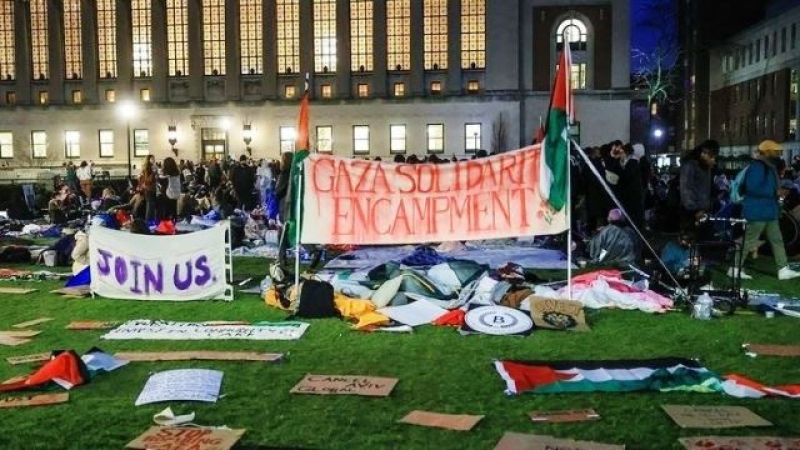- Bangladesh criticises Rajnath remarks on Yunus |
- ‘Very unhealthy’ air quality recorded in Dhaka Sunday morning |
- Harassment, corruption shade Begum Rokeya University, Rangpur |
- Sikaiana Islanders Face Rising Seas and Uncertain Future |
- BD Election Commission to begin political dialogue this week |
The Arrest and Detention of Columbia University Students

Demonstration by Columbia University students.
By Sanen Marshall
The recent arrest and detention of Columbia University students Mahmoud Khalil and Yunseo Chung by ICE agents represents an alarming development in US higher education. Both permanent US residents, Khalil organised Palestinian protests and served as a representative to university administrators, while Chung was arrested simply for attending protests and allegedly not cooperating with police during a bomb threat.
Neither student faces formal charges. Chung has filed a lawsuit against President Trump and Secretary of State Rubio for rights violations. Meanwhile, White House Press Secretary Karoline Leavitt claimed Khalil was distributing Hamas flyers—an allegation his pregnant wife, present during his arrest, firmly denied.
The circumstances of both arrests raise serious campus safety concerns. ICE officials reportedly lacked an arrest warrant when detaining Khalil, raising questions about Columbia's possible collusion. In Chung's case, officers allegedly accessed and searched student dormitories, implying collusion on the part of the university's authorities. She was eventually arrested at home.
These arrests occurred against the backdrop of Columbia University's compliance with Trump administration demands to secure, or rather restore, $400 million in federal funding. The university has banned masks during protests, hired security officers with arrest powers, and appointed oversight for the Department of Middle East, South Asian, and African Studies—actions that significantly erode academic freedom on campus. Columbia's interim president has since resigned, having headed the university for less than a year. Her predecessor suffered a similar fate.
Even before Trump took office, university leaders faced intimidation. Both University of Pennsylvania President Liz Magill and Harvard President Claudine Gay resigned after facing pressure during Senate hearings about campus protests. Gay's resignation followed plagiarism allegations that many colleagues described as "frivolous," with suspicious timing shortly after she declined to condemn student protesters.
Today's campus environment differs drastically from when Palestine protests began. University officials now actively discourage Middle East commentary. At Columbia, students were advised against posting Middle East content on social media. When a Palestinian student objected, the journalism school's dean ominously stated, "Nobody can protect you. These are dangerous times."
This warning proved accurate. Rumeysa Ozturk, a Turkish national, a former Fulbright scholar and Columbia University student, now a Tufts University PhD student, was arrested recently. She co-authored a campus newspaper op-ed criticising Israel for genocide and Tufts for not divesting from Israel. The Department of Homeland Security claimed she "engaged in activities in support of Hamas." A judge has temporarily halted the attempt to deport her.
Khalil, Chung, and Ozturk await their day in court while Trump's targeted university list has expanded to over 60 institutions. This unprecedented clampdown in American higher education—long proud of its liberal arts tradition and experiential learning—raises serious concerns. With students attending classes bordering on indoctrination while their protesting peers face arrest on campus, one questions why anyone would enrol in Middle Eastern studies courses, let alone pay for them
Sanen Marshall is a Political scientist with an anthropological, historical and linguistic research interest in two major northern Borneo ethnic groups, the East Coast Bajau and the Central Kadazan/Dusun. He is also a JUST member. 31 March 2025

